Contents
If your child is applying to a selective independent school, you might have heard about Quest Admissions: an entrance exam used by many leading schools across the UK.
Whether you’ve just started researching or are supporting your child through the final stages of preparation, this guide will help you understand what to expect from Quest Admissions. Plus, we're here to help your child feel confident and ready on exam day.
We've got comprehensive resources to guide you through every possible component of the Quest test. This includes the most realistic practice tests on the market for Parts 1 and 2.
Key takeaways
Quest Admissions is an entrance exam used by a growing list of over 160 UK schools. It's used to assess candidates for selective entry.
The exam is split into two parts. Part 1 covers English, maths, and reasoning. Part 2 covers puzzles and problem solving, and creative comprehension.
Some schools use both parts of the exam, while others only use Part 1 or a bespoke selection of subjects. It’s important to check your target school’s website to learn which parts your child will be tested on.
The test includes adaptive and non-adaptive questions, designed to measure how children think, not just what they know.
Children can prepare by building strong foundations, reading widely, developing critical thinking, solving puzzles, and practising test techniques.
Atom Home helps children build the skills assessed in Quest Admissions, Parts 1 and 2, through personalised learning, unlimited mock tests, and smart progress tracking.
What is Quest Admissions?
Quest Admissions is created by Quest Assessments. It's an exam provider for selective schools. It helps schools understand each child’s academic potential.
Quest is designed to stretch bright young minds, assessing how children think and solve problems, rather than just testing what they can remember from the school curriculum.
With two parts, it offers schools a well-rounded picture of each child’s potential. Schools can choose whether to use both parts or a selection of subjects in their entry process.
How do 11+ Quest tests differ from traditional entrance exams?
Traditional entrance exams usually involve long, written papers. Quest takes a more modern approach. Its assessments are shorter, can be taken online or on paper, and cover a wider mix of skills, from core subjects to reasoning and problem-solving.
Some modules even use adaptive questioning, where the difficulty adjusts to your child’s answers during the exam, giving schools a clearer picture of their ability.
What makes Quest truly unique is Quest Part 2. Quest is the only exam provider to include this stage, which looks beyond academics to skills such as collaboration, communication, and creativity. It’s a chance for children to show strengths that traditional exams often miss, and one of the key reasons schools are increasingly choosing Quest.
Try Quest Part 2 practice questions
Take a look at some practice questions to get a sense of how Part 2 is formatted.
Which schools use Quest Admissions?
Over 100 senior schools use Quest in their entrance process. Most of these schools are listed below.
Aldenham School
Ashford Senior School
Berkhamsted School*
Brighton Girls GDST
Canford School
Cheltenham Ladies’ College
Chigwell School
City of London School
Cokethorpe School
Croydon High School
Dame Allan’s Schools
Dauntsey’s School
Derby High School
DLD College London
Dulwich College
Dunottar School
Durham School*
Ellesmere College
Emanuel School*
Ewell Castle School
Felsted School
Forest School
Frensham Heights School
Gateways School
Giggleswick School
Gordonstoun
Gresham’s School
Haberdashers Monmouth Schools
Haberdashers’ Elstree Schools
Halstead St Andrew’s
Harrow School
Headington Rye Oxford
Ibstock Place School
Kensington Park School
King’s Ely Senior School
Knightsbridge Senior School
Leicester High School for Girls
Lomond Senior School
Lord Wandsworth College
Magdalen College School
Marlborough College*
Merchant Taylors' School
Mill Hill Senior School
North Bridge House Senior Canonbury
North Bridge House Senior Hampstead
Northampton High School GDST
Norwich High School for Girls GDST
Norwich School
Notre Dame Senior School*
Oakham School
Oxford High School
Prior Park College
Putney High School
Queen Elizabeth’s Hospital Bristol
Ratcliffe College
Reading Blue Coat School
Royal Grammar School Newcastle
Royal Grammar School Worcester*
Roedean School
Royal Russell School
Rugby School
Sherborne Girls
Shrewsbury School*
St Albans School
St Columba’s School, Kilmacolm
St Edmund’s Senior School, Canterbury
St James’ Senior Boys’ School
St James’ Senior Girls’ School
St Joseph’s College
St Mary’s Calne
St Mary’s School, Cambridge
St Peter’s School
Strathallan School
Surbiton High School
Sydenham High School GDST
Taunton School
The King’s School, Chester*
The Maynard School
The Portsmouth Grammar School
The Stephen Perse Foundation
Thomas’s College*
Thomas’s Putney Vale
Trinity School
Truro High School
Uppingham School
Wellington College*
Westminster School*
Wetherby Pembridge
Wetherby Senior School
Whitgift School*
Woldingham School*
Wolverhampton Grammar School
Worth School
*Not at main entry
What does Quest Admissions test?
A Quest Admissions entrance exam consists of one or two parts. Your child’s target school will decide which parts to use in their entry process.
Both can be taken online or on paper.
Part 1
Part 1 tests your child in core areas: English, maths, verbal reasoning and non-verbal reasoning. Schools can choose a combination or all of these subjects. The exams are designed to not only test your child's understanding of the Key Stage 2 curriculum, but also how they think and solve problems.
For more information about which subjects will be tested on your child’s exam, check your target school’s website.
Some of the content in Part 1 can be adaptive. This means that questions are tailored to your child's responses. If your child answers lots of questions correctly, they will see more challenging questions.
Adaptive testing adjusts to your child’s level. It keeps them motivated by avoiding questions that are too hard - or too easy - so they can show what they’re really capable of.
Maths
The maths section covers the topics taught on the Key Stage 2 national curriculum. Children taking a Quest assessment for 11+ entry will be tested on topics taught up to the end of Year 5.
Your child will be tested on:
arithmetic
number
geometry
measurement
statistics
They will also have questions which assess mathematical reasoning and problem-solving. Your child will need to think carefully when answering these questions, as they’ll likely need to solve problems with several steps. They will have scrap paper and pencils to help them work through the problems.
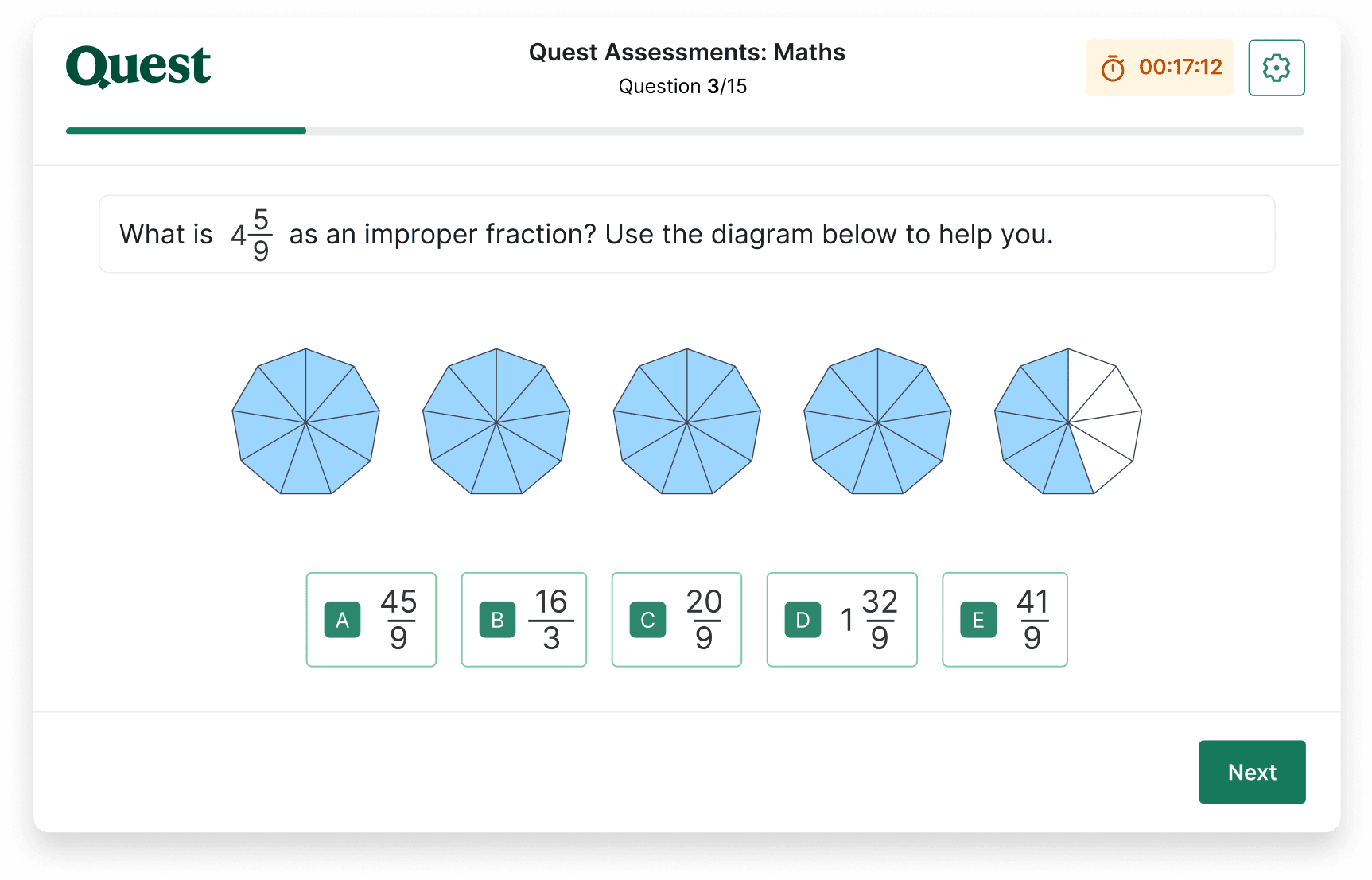
English
The English section includes a reading comprehension exercise. Your child will read a passage and answer questions to show they understand it, can think about what it means, and work out ideas that aren’t directly said.
Quest works with writers to produce challenging fiction and non-fiction texts that children enjoy. All texts are bespoke, so they are completely unseen for all children.
Some schools also include questions that test spelling, punctuation, grammar, and vocabulary and how your child can apply these skills in context. These questions cover topics including verb tenses, the main parts of speech, synonyms and antonyms.
Reading widely will help your child build these skills. This includes reading texts across different genres, and written by a range of authors.
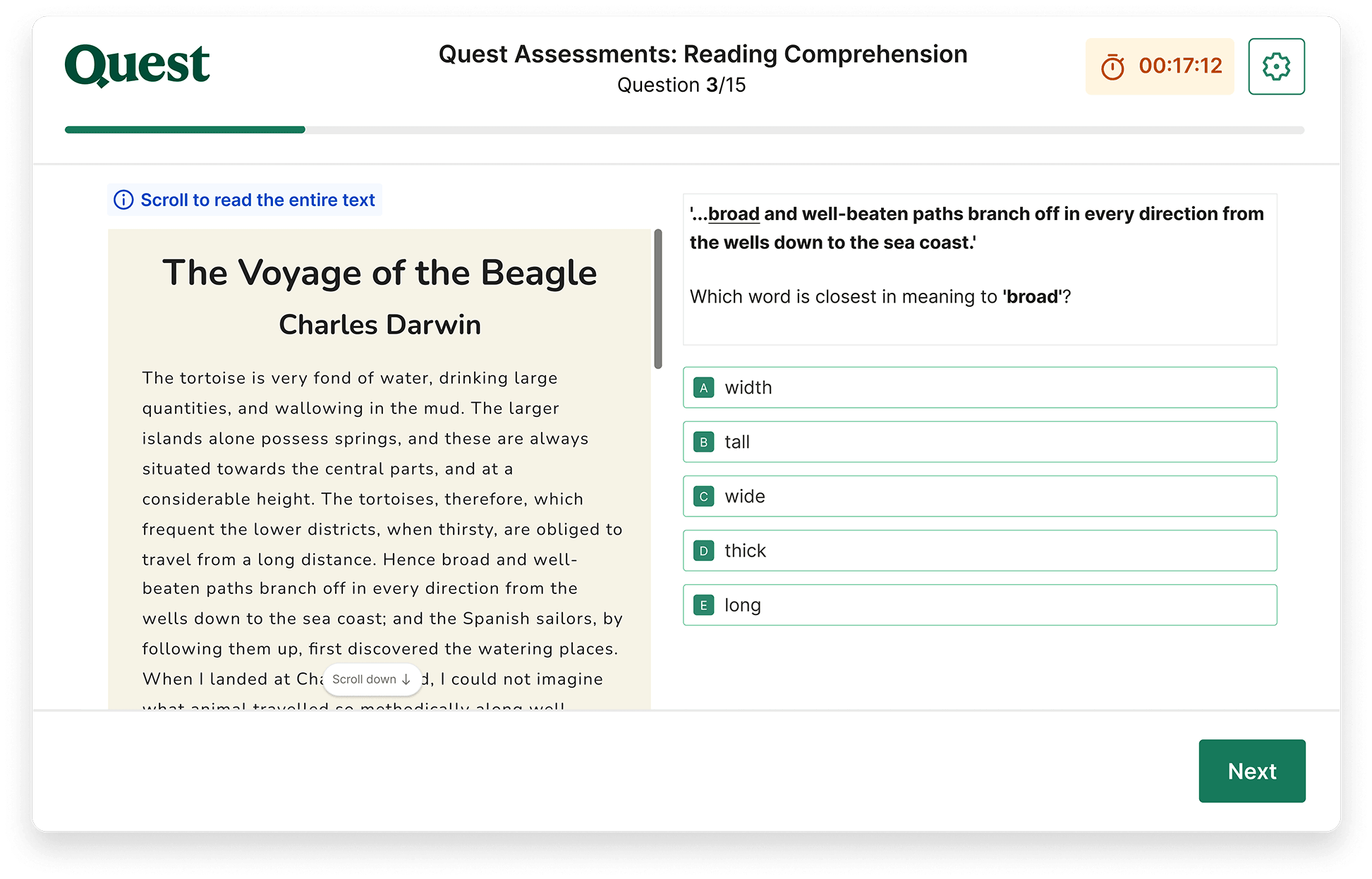
Verbal reasoning
Verbal reasoning measures your child’s ability to reason and solve problems with written information, like letters and words. In Quest exams, this involves solving problems with vocabulary and spotting patterns or making logical connections. Children who read widely and have a broad vocabulary will be well-prepared for these questions.
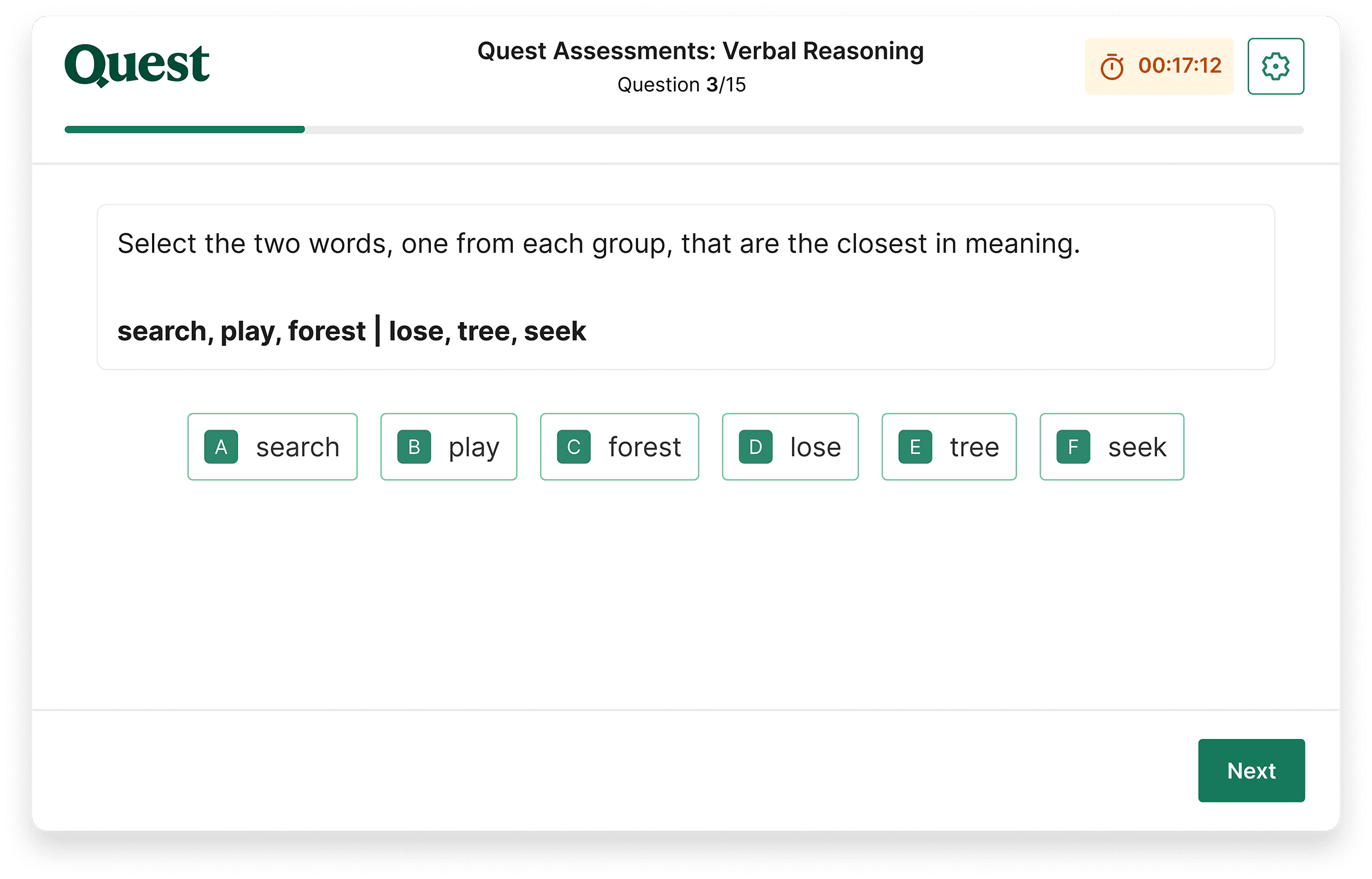
Non-verbal reasoning
Non-verbal reasoning involves analysing visual information and solving problems using shapes, diagrams, and pictures. These sorts of questions test skills such as logic, spatial awareness, and maths. Playing puzzles and games such as Sudoku, Lego and Rubik’s Cubes is a great way to practise these skills.
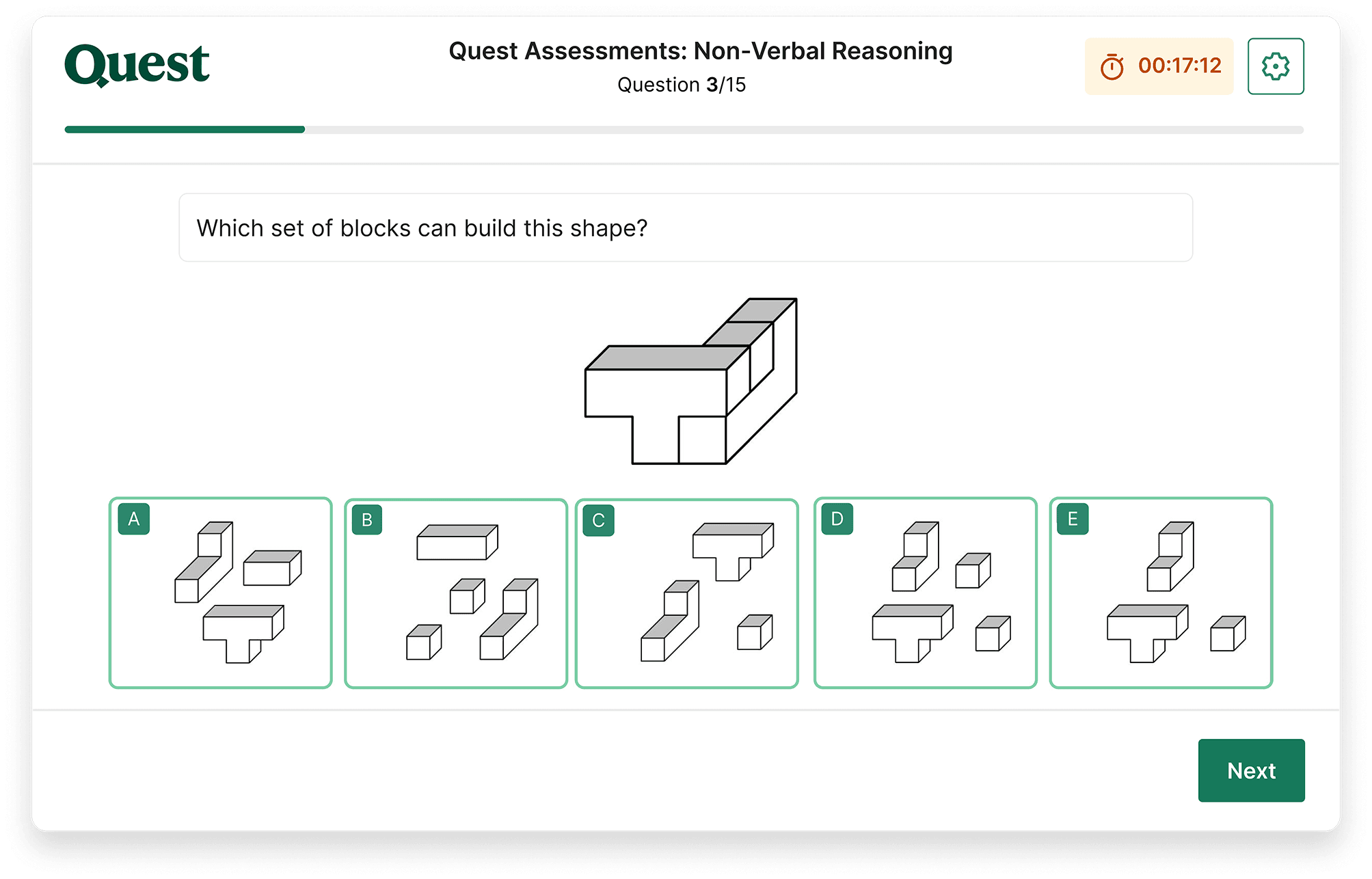
Part 2
Some schools include Quest Admissions Part 2 in their entry processes.
This section is not adaptive. All children see the same questions. However, some children might progress further through the questions than others.
Puzzles and problem-solving
This section assesses your child’s ability to reason with information and solve problems using interactive puzzles. It requires careful thinking and a logical, step-by-step approach.
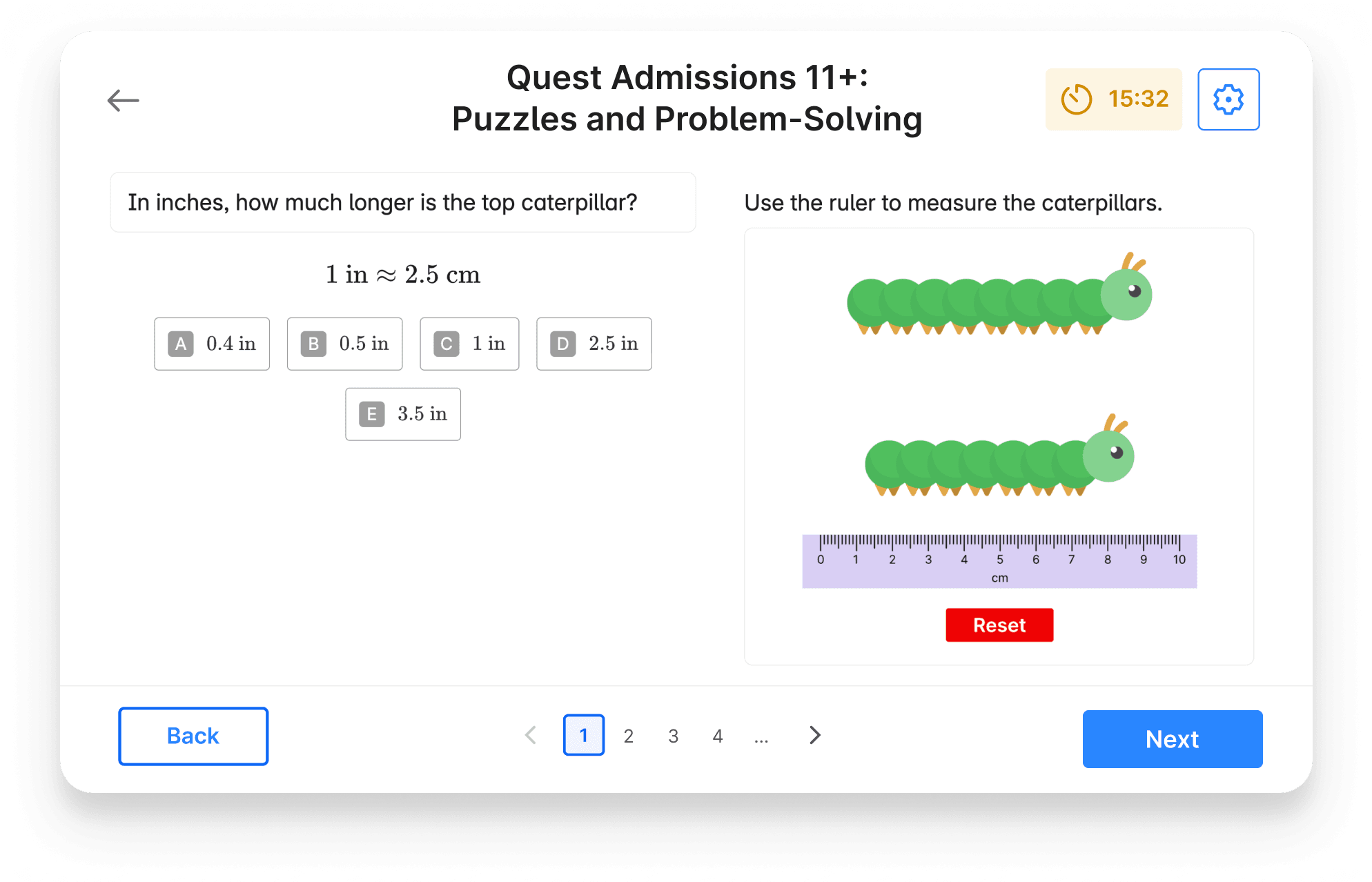
Creative comprehension
In this section, your child will see a range of bespoke sources created for a specific theme. For instance, they might see a map, a graph, and a diary entry all based on the Trojan War.
Your child will need to use the information from each source to answer questions. They might have to look at several sources at the same time to choose an answer.
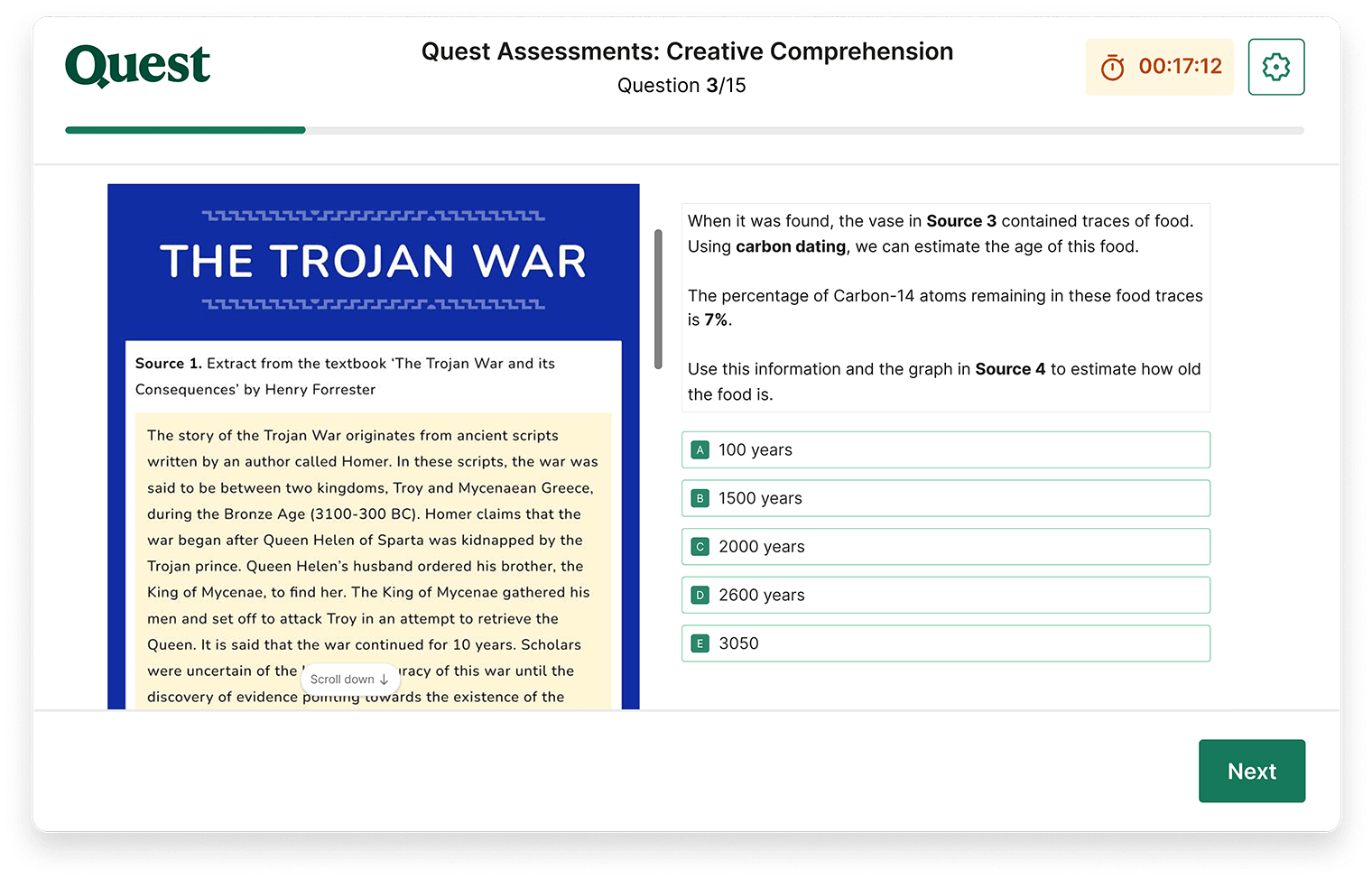
Get your free Quest preparation pack
Your guide to Quest Admissions Part 1 and 2. Ideal for talking your child through the exam format, practice questions and how to prepare.
How are Quest Admissions tests marked?
Quest Admissions exams are marked online by smart technology. This reduces any potential for human error.
Some schools choose to include an optional creative writing task. If your target school sets this task, examiners will mark it.
Your target school will receive detailed data on your child’s performance in each subject and subtopic, and a summary report showing standardised age scores and rankings.
While assessments are useful for understanding your child’s strengths, admissions teams often look at a range of information to decide whether your child is likely to thrive at the school.
Some other things they may consider alongside exams include:
A handwritten creative writing task, to assess your child's written English and creative thinking
A school reference (i.e. from your child's current headteacher) to find out more about their character and attitude at school
An interview, to get an idea of how your child interacts with others, find out more about their interests, and see if they resonate with the school's values and ethos
The admissions section of the school website will give you more information on what they are looking for.
How can I help my child prepare for Quest Admissions?
Getting ready for the Quest Admissions exam can feel like a lot. But with the right support at home, your child can step into the exam with self-belief.
The exam is designed to challenge all learners – especially those who love reading, exploring new ideas, and solving problems. But that doesn’t mean preparation has to be stressful. In fact, the best way to support your child’s success is by helping them build strong knowledge, encouraging them to read widely and often, and nurturing their natural curiosity about the world around them.
Here are some simple, effective ways you can support your child with every part of the exam, from reading and reasoning to problem-solving and test techniques.
Build strong foundations
When preparing for entrance exams like Quest Admissions, it’s natural to want to dive straight into practice tests. But without a solid understanding of the curriculum, this can knock your child’s confidence and lead to unnecessary stress.
Focus on building a secure grasp of key topics first. Short, regular study sessions are most effective — around 30 minutes at a time for children aged 10–11. This helps children absorb information in manageable chunks, boosting long-term memory and motivation.
Atom Home supports your child’s learning with interactive questions, engaging explanations, and smart technology that adapts to their level. It keeps challenge and enjoyment perfectly balanced, so they stay motivated, curious and confident.
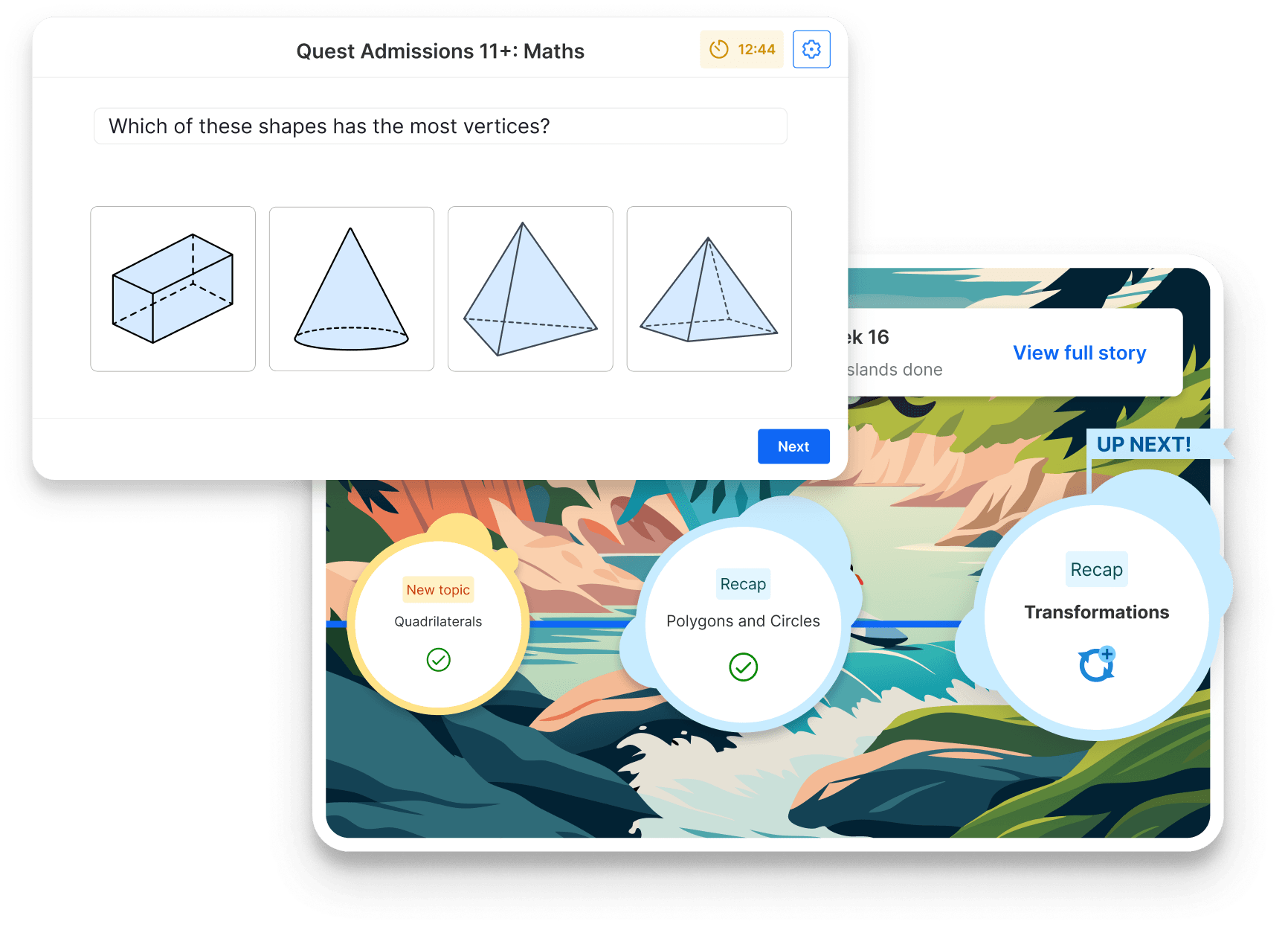
Read often, and read widely
To succeed in English, verbal reasoning, and creative comprehension, your child needs to read with confidence. The more they read, the more they’ll grow their vocabulary, comprehension skills and imagination.
Encourage your child to read a variety of genres – from mysteries and adventure stories, to biographies and non-fiction. Reading books by authors from different backgrounds will also help them understand a wide range of voices, tones and perspectives.
Just 15–20 minutes of reading a day can make a big difference.
Get your free reading list
For inspiration, explore our curated reading list for children aged 7-11.
Nurture critical thinking and curiosity
Part 2 of Quest Admissions tests creative comprehension. Your child will need to draw connections between multiple sources and think beyond the text.
These skills can grow naturally at home through open conversations and curiosity-led exploration. Try discussing books, articles or even films together. Ask questions like:
“What would you do in this situation?”
“How is this similar to something else you’ve read or watched?”
“Why do you think the writer chose to present it that way?”
Encourage your child to follow their interests, whether that’s animals, engineering, geography or art! They could create a mini project, research something new, or teach you a fact they’ve learned.
These kinds of activities help them practise analysing information, spotting links and thinking creatively – exactly what the creative comprehension section is all about.
Make problem-solving playful
Quest Part 2 also includes puzzles and problem-solving tasks that assess logic, reasoning and pattern-spotting.
The good news? These skills can be built in fun, relaxed ways. Board games and logic puzzles are great tools for stretching your child’s brain and encouraging strategic thinking! Try:
Chess, draughts, or Connect 4 for strategic thinking, like planning ahead
Logic games like Sudoku, tangrams or codebreaking puzzles
Puzzle apps or hands-on challenges like brainteasers and Rubik’s cubes
These games build focus, resilience and flexible thinking. These are essential qualities for approaching tricky exam questions with confidence.
Practise test technique
Once your child is performing well in all key topics, it’s a great time to introduce mock tests. They help your child get used to the format of challenging tests and build important skills like time management and focus under pressure.
Mock tests also highlight any gaps in understanding, helping you target revision where it’s needed most.
With Atom Home, you’ll have unlimited access to online and printable mock tests tailored to your target schools. Tests are marked instantly, with clear insights into your child’s progress — so they can walk into exam day feeling confident, calm, and well prepared.
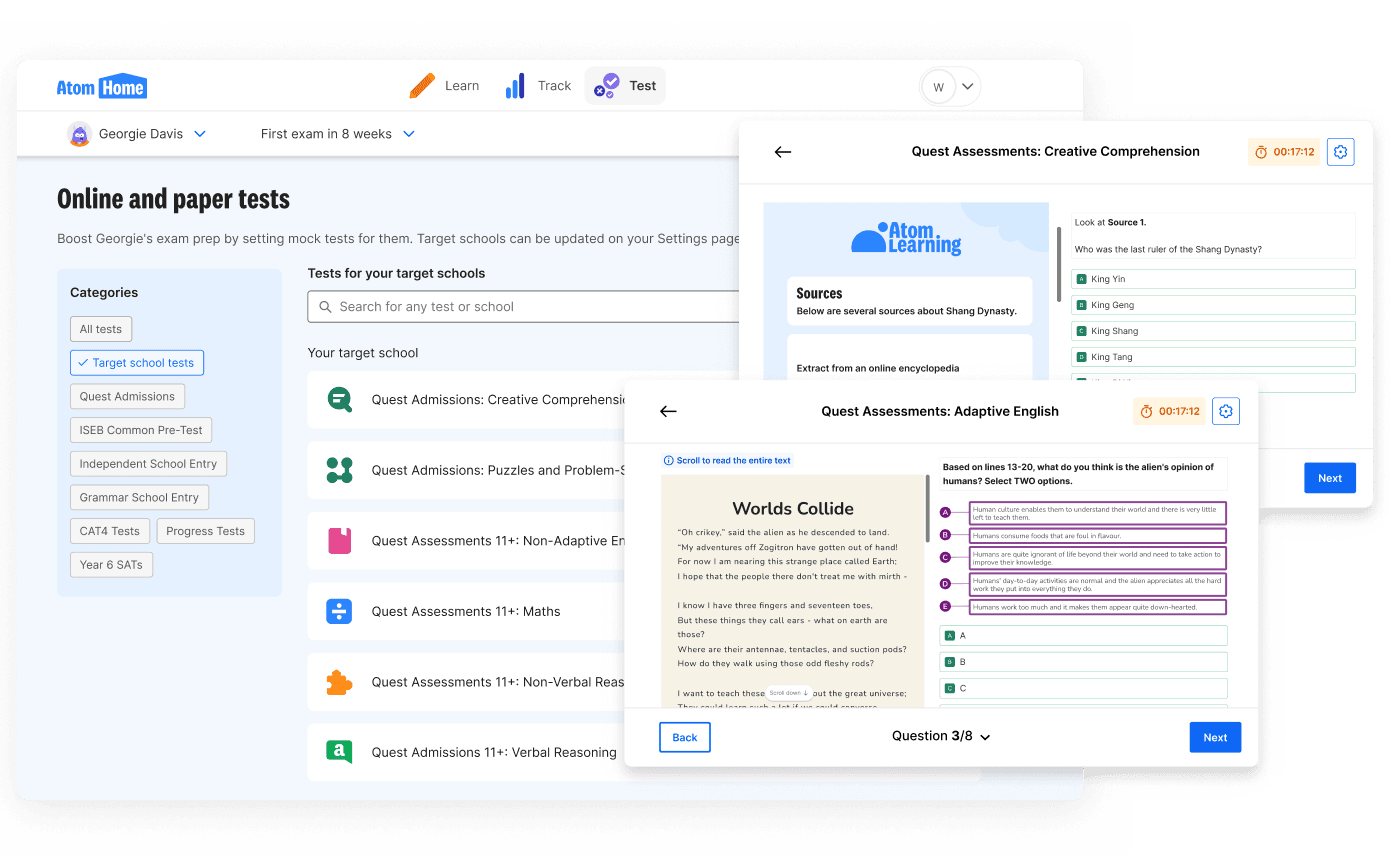
Celebrate progress every step of the way
Learning is a journey, and celebrating each milestone keeps motivation high. Help your child set small, achievable goals, and take time to recognise the effort they’re putting in.
Encouraging a growth mindset can make all the difference. When your child faces a challenge or makes a mistake, remind them that this is part of the learning process. Progress isn’t about being perfect; it’s about keeping going.
With regular encouragement and positive reinforcement, your child will build resilience and confidence, ready to tackle the Quest Admissions exam with their best foot forward!
Build key skills for Quest with Atom Home
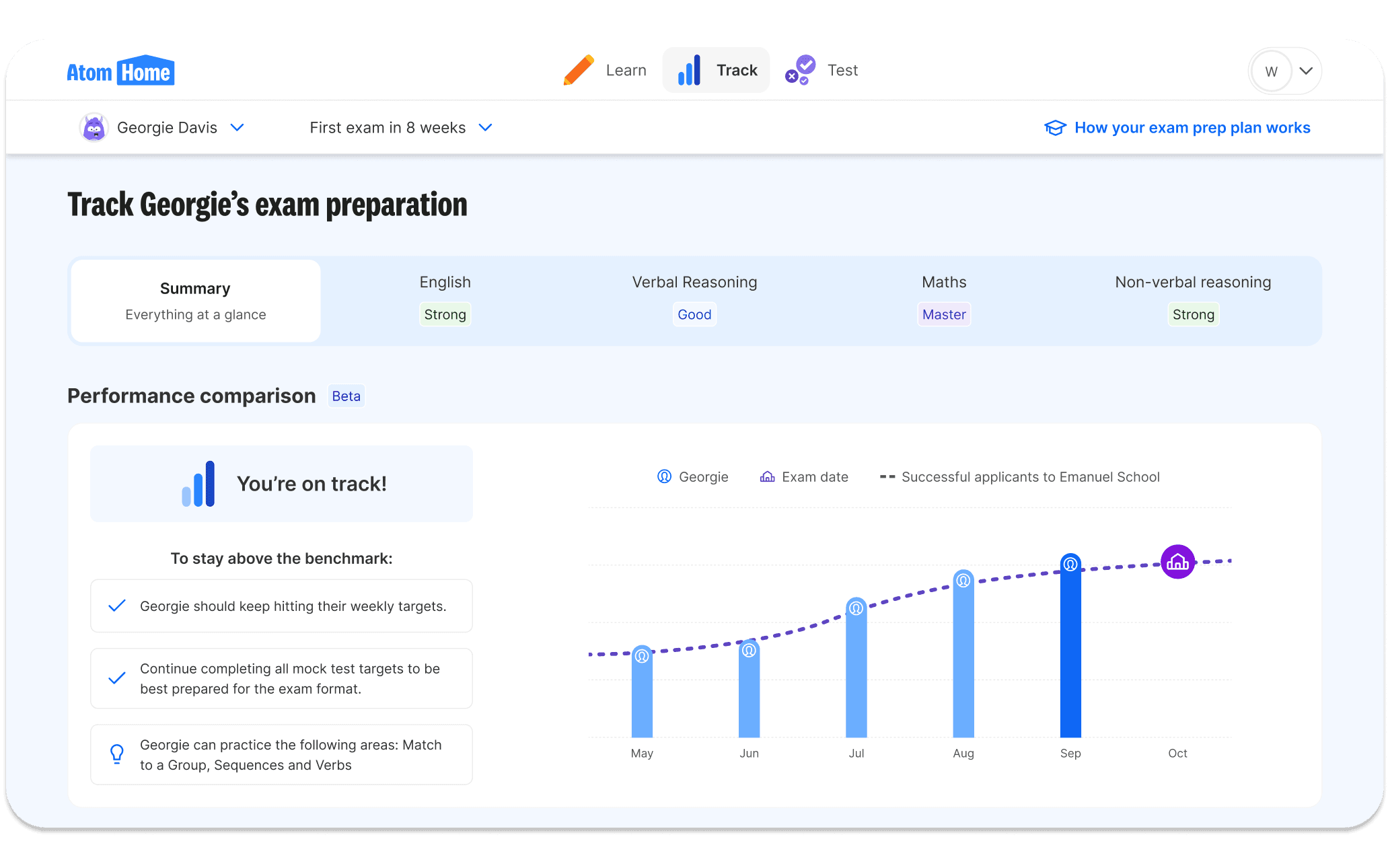
Quest Admissions are designed to explore how children think – not just what they know. With Atom Home, your child can build the key skills that support success in these areas, including logic and problem-solving, reasoning, and reading comprehension.
Through fun, interactive learning and a personalised approach, Atom helps children feel confident, curious, and ready to tackle new challenges.
What do I get with Atom Home?
Follow a personalised learning journey tailored to your child’s target schools. Simply select your target schools at sign-up, and Atom will guide your child through all the relevant topics to ensure they’re fully prepared by exam day.
Explore 100,000+ interactive questions across all key exam topics, designed to make learning fun, focused and rewarding.
Build confidence with realistic practice tests for both part 1 and 2, so they feel calm and capable under timed conditions.
Track their progress with smart insights, helping you celebrate their growth and support areas that need a little more attention.
Start learning today
Start your free trial today and support your child in reaching their full potential in exams and beyond.
Contents
